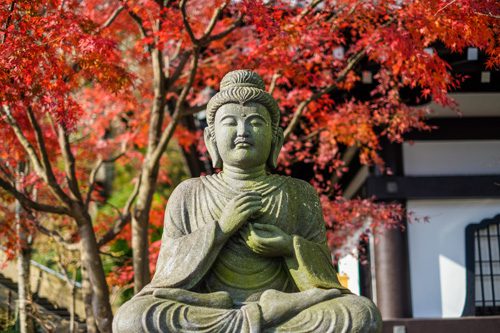 Many people in addiction recovery find that discovering or rediscovering a spiritual connection is helpful in their journey.
Many people in addiction recovery find that discovering or rediscovering a spiritual connection is helpful in their journey.
Buddhism, which is both a religion and a way of life, has elements that can be helpful to those in recovery. These include mindfulness, meditation, and a means of relieving stress.
Four Truths of Buddhism
Buddhism was founded approximately 2,500 years ago by Siddhartha Gautama, who later became known as the Buddha. The faith centers on this spiritual teacher, as opposed to a deity.
The Buddha taught four Noble Truths:
- Life is suffering
- The cause of suffering is desire
- There is a way to end suffering; It is available to anybody
- The key to end suffering is to remove desire
These four truths can be meaningful to a person in recovery from drug or alcohol abuse. The idea that suffering is universal reminds the addicted person that they are not alone and that everyone has similar experiences.
The second truth, which explains that the cause of suffering is desire, also speaks to addiction. The reason for an addict’s struggle with their disease is because they are having cravings for their drug of choice.
The third truth offers hope that suffering can be brought to an end. This leads directly to the fourth truth, which is to remove desire. If an addict can find ways to deal with cravings, it is possible to maintain sobriety on a daily basis.
Buddhism and Mindfulness in Recovery
The practice of becoming mindful focuses on fully experiencing what is going on in the moment. It requires using all of the senses to evaluate thoughts and emotions. Done properly, there isn’t room for dwelling on the past or projecting about the future. One must be fully focused on what is happening in the here and now.
Mindfulness requires slowing down to allow the sensations one is experiencing to register. These include both the pleasant and unpleasant ones. It’s possible to eat a meal, drink a cup of coffee, brush one’s teeth, take a bath or shower or simply sit in a chair mindfully.
Meditation in Recovery
Meditation is one of the core principles in buddhism. It is used as a method for identifying and dealing with troublesome feelings. When meditating, the person focuses on their breath and lets go of their thoughts.
This requires practice, since random thoughts tend to come up during a meditation session. When they arise, they are welcomed without judgment and gently sent on their way. Over time, meditation can help an addict to be more self-accepting. They learn not to judge themselves over past events, which are finished and can no longer be controlled.
Buddhism and Stress Relief
Buddhism’s teachings can help recovering addicts by relieving stress. One of its Noble Truths is that the key to ending suffering is to remove desire. Stress is often an indication of the desire to control one’s environment or future events.
Many events that occur are out of an individual’s control. Trying to keep all of the proverbial “balls in the air” and maintain control of everything in one’s life is not going to work out well for anyone. It’s going to end up being a source of stress for anyone who tries to be in perfect control of their life, their environment and the people around them all the time.
Through mindfulness and regular meditation, a recovering addict can learn to relax and live more in the moment. The idea of living “one day at a time” works well for people who are in recovery. If they are in the early stages and are finding it challenging to deal with cravings for drugs or alcohol, breaking down a day into even smaller intervals (an hour, a few minutes) can be helpful.

 Many people in addiction recovery find that discovering or rediscovering a spiritual connection is helpful in their journey.
Many people in addiction recovery find that discovering or rediscovering a spiritual connection is helpful in their journey.